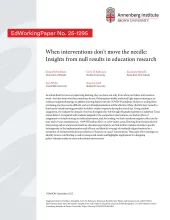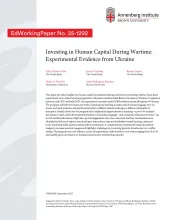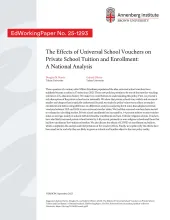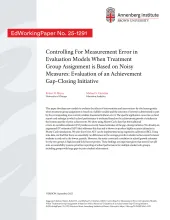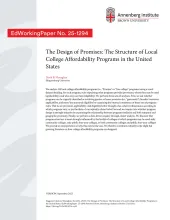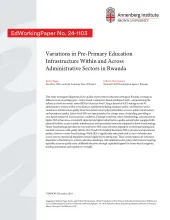Follow the User Guide to start building your site.
Follow the User Guide to start building your site.
NEW EdWorkingPapers
When interventions don’t move the needle: Insights from null results in education research
As school districts focus on improving learning, they can learn not only from when and where interventions work—but also from why they sometimes do not. Policymakers widely embraced high-impact tutoring as an evidence-supported strategy to address learning delays from the COVID-19 pandemic. However, scaling these promising practices can be difficult, and not all implementations will be… more →
Investing in Human Capital During Wartime: Experimental Evidence from Ukraine
This paper provides insights into human capital investments during wartime by presenting evidence from three experiments of an online tutoring program for Ukrainian students amid Russia’s invasion of Ukraine. Conducted between early 2023 and mid-2024, the experiments reached nearly 10,000 students across all regions of Ukraine. The program offered three hours per week of small-group tutoring… more →
The Effects of Universal School Vouchers on Private School Tuition and Enrollment: A National Analysis
Three-quarters of a century after Milton Friedman popularized the idea, universal school vouchers have suddenly become a reality in 17 states since 2021. These new policies promise to be one of the most far-reaching reforms in U.S. education history. We make two contributions to understanding this policy. First, we provide a rich description of the private school sector nationally. We show… more →
Controlling For Measurement Error in Evaluation Models When Treatment Group Assignment is Based on Noisy Measures: Evaluation of an Achievement Gap-Closing Initiative
This paper develops new models to evaluate the effects of interventions and intervention-by-site heterogeneity when treatment group assignment is based on a fallible variable and the outcome of interest is determined in part by the corresponding true control variables (measured without error). The specific application concerns a school report card redesign in which school performance is… more →
The Design of Promises: The Structure of Local College Affordability Programs in the United States
We analyze 314 local college affordability programs (i.e., “Promise” or “free college” programs) using a novel dataset detailing, for each program, rules stipulating what programs provide (provision), where they may be used (applicability), and who may use them (eligibility). We perform three sets of analyses. First, we ask whether programs can be cogently described as involving greater or… more →
Variations in Pre-Primary Education Infrastructure Within and Across Administrative Sectors in Rwanda
This study investigates disparities in the quality of pre-primary education settings in Rwanda, where centre-based, community-based, and home-based modalities coexist under a single policy framework. Drawing on data from 4,875 settings across 91 administrative sectors in seven districts, we applied multilevel models to distinguish within-sector differences between setting types from between-… more →
